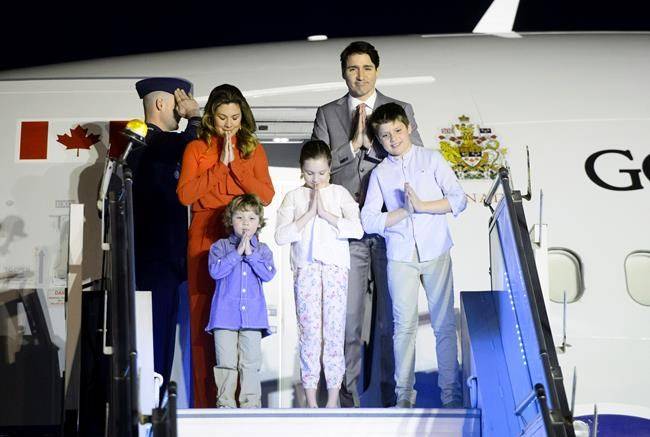Prime Minister Justin Trudeau’s state visit to India is officially underway as he arrived with his family in New Delhi at sundown on Saturday.
The family, including wife Sophie Gregoire Trudeau, and kids Xavier, 10, Ella-Grace, 9, and Hadrien, 3, emerged from the plane and delivered a traditional Indian welcome greeting, with their hands clasped together and their heads slightly bowed, to the delight of officials and Indian media waiting on the ground.
Hadrien did his best to steal the show, making off down the red carpet with the flowers handed to his father by an Indian official, leaving the rest of his family to manage the receiving line.
Trudeau’s trip to India included a refuelling stop in Rome, where Trudeau got out the kinks out midway through the 20-hour long journey by going for a run with his protective detail.
The seven-day Indian state visit is a mix of business meetings, round tables on education, women’s rights and human rights, tours of popular Indian sites and a meeting with Indian Prime Minister Narendra Modi later in the week.
“Wheels up for India and a busy visit, focused on creating good jobs and strengthening the deep connection between the people of our two countries,” Trudeau posted on his official Twitter account, along with a photo of the family boarding the plane in Ottawa.
The Trudeaus were greeted in Delhi by Nadir Patel, Canada’s high commissioner in India, his wife, Jennifer Graham, and their two-year-old daughter, Nylah.
Vikas Swaraup, the Indian high commissioner to Canada was also on the red carpet for the arrival, live tweeting shots waiting for the plane to land and once it was on the ground, saying that ”a long wait is finally over.”
Indian Minister of State for agriculture Gajendra Singh Shekhawat was the first to shake hands with the Trudeau family and was the one who gave Trudeau the bouquet Hadrien later absconded with.
Shekhawat’s presence is notable because among the concerns Trudeau is being asked to raise with the Indian government on this visit is recent Indian import taxes applied to chickpeas and other pulse crops.
A duty of 30 per cent was applied to chickpeas and lentils just before Christmas and was raised to 40 per cent on February 6, with the Indian government citing falling international market prices for the crops, abundant production elsewhere and a negative impact on Indian producers and domestic Indian prices of cheap imports.
A 50 per cent import duty was applied to yellow peas in November.
Conservative International Trade Critic Dean Allison was critical of Trudeau Friday for not including Canadian Agriculture Minister Lawrence MacAulay on this trip to try and address the import duties. Innovation Minister Navdeep Bains, Small Business and Tourism Minister Bardish Chagger, Science Minister Kirsty Duncan and Infrastructure Minister Amarjeet Sohi all travelled with Trudeau to India. Foreign Affairs Minister Chrystia Freeland and Defence Minister Harjit Sajjan will meet him in the country.
Allison said Trudeau needs to explain what he plans to do to fight these duties when he isn’t bringing his agriculture minister to the table, given that India is an important export market for Canadian pulse producers.
Trade between India and China has more than doubled to $8.4 billion in the last decade. India is also the second largest source of immigrants to Canada and is a significant source of international students enrolling in Canadian universities.
Security is also going to be on the agenda on this trip regarding defence and counter-terrorism efforts. Canadian National Security Advisor Daniel Jean was in India last week to meet with his Indian counterpart to work on parts of the visit.
The issue of Indian politicians fearing there is a rise in Sikh separatist extremism behaviour coming out of Canada is also going to hang over this visit.
Trudeau’s first full-day itinerary Sunday includes a flight to Agra for a tour of the famed Taj Mahal before returning to Delhi for a round table with non-governmental organizations.
Mia Rabson, The Canadian Press



